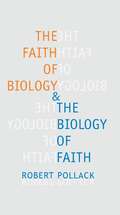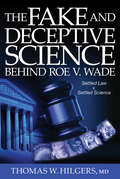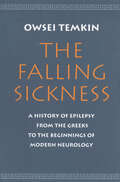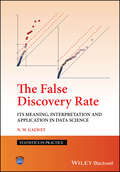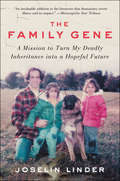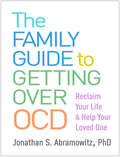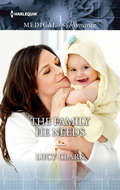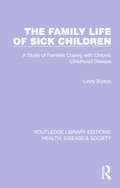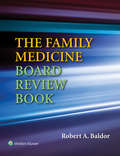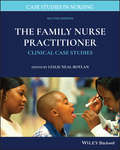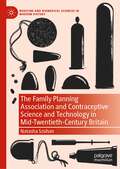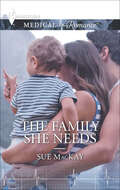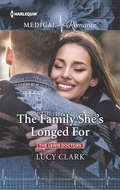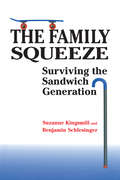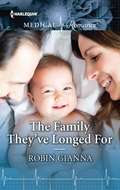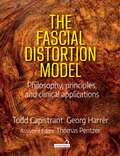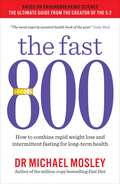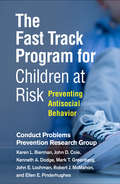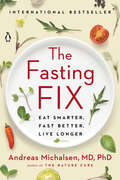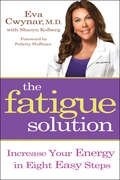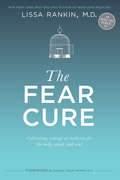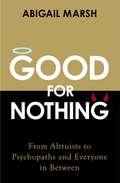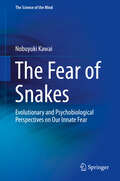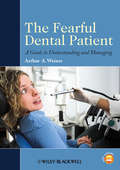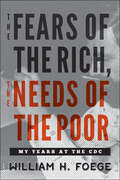- Table View
- List View
The Faith of Biology and the Biology of Faith: Order, Meaning, and Free Will in Modern Medical Science (Leonard Hastings Schoff Lectures)
by Robert PollackAre there parallels between the "moment of insight" in science and the emergence of the "unknowable" in religious faith? Where does scientific insight come from? Award-winning biologist Robert Pollack argues that an alliance between religious faith and science is not necessarily an argument in favor of irrationality: the two can inform each other's visions of the world.Pollack begins by reflecting on the large questions of meaning and purpose—and the difficulty of finding either in the orderly world described by the data of science. He considers the obligation to find meaning and purpose despite natural selection's claim to be a complete explanation of our presence as a species—a claim that calls upon neither natural intention, nor design, nor Designer. Next, the book focuses on matters of free will, from the choice of a scientist to accept evidence, to the choice of a religious person to accept a revelation, to a patient's loss of free will in medical treatment. Here Pollack addresses questions of ethics and offers a provocative comparison of two difficult texts whose contents remain incompletely understood: the DNA "text" of the human genome and the Hebrew record of Jewish written and oral law. In closing, Pollack considers the promise of genetic medicine in enabling us to glimpse our own future and offers a reconsideration of the possible utility of the so-called placebo effect in curing illness.Whether refuting a DNA-based biological model of Judaism or discussing the Darwinian concept of the species, Pollack, under the banner of free inquiry, presents a genuine, vital, and well-argued assay of the intersection of science and religion.
The Fake and Deceptive Science Behind Roe V. Wade: Settled Law? vs. Settled Science?
by Thomas W. HilgersOur schools and healthcare institutions have abandoned the Hippocratic Oath and the Declaration of Geneva and replaced it with a policy of lethalism ...This is a direct result of the Court's acceptance and promotion of archaic scientific reasoning (Roe v. Wade) that, at best, would be considered pre-medieval and clearly out of touch with scientific reality. Fallout includes the expansion into fetal experimentation, human cloning, embryonic stem cell research, infanticide, and even physician-assisted suicide programs. The respect for life ethic has slowly been removed as the Supreme Court has so strongly supported the "lethalism becomes a way of life" ethic. Especially interesting is the lack of support for any positive solutions to these issues.The recognition is that life at all stages in the womb is precious and able to make extraordinary contributions to our ability to love and to be loved, to bring about peace and to be at peace, to extract love in ways that only a very young and precious life is able to extract, and to express love in ways that can be boundlessly meaningful. As we move to reestablish the human right to live, we must also move beyond lethalism and install positive, life-affirming and meaningful solutions to real human problems.God bless us all as we move in this direction!
The Falling Sickness: A History of Epilepsy from the Greeks to the Beginnings of Modern Neurology
by Owsei Temkin"A thoroughly admirable and informative introduction to our knowledge of epilepsy in the Western world from antiquity to the early twentieth century." - American ScientistOwsei Temkin presents the history of epilepsy in Western civilization from ancient times to the beginnings of modern neurology. First published in 1945 and thoroughly revised in 1971, this classic work by one of the history of medicine's most eminent scholars now returns to print available in both paperback and eBook formats.
The False Discovery Rate: Its Meaning, Interpretation and Application in Data Science (Statistics in Practice)
by N. W. GalweyThe False Discovery Rate An essential tool for statisticians and data scientists seeking to interpret the vast troves of data that increasingly power our world First developed in the 1990s, the False Discovery Rate (FDR) is a way of describing the rate at which null hypothesis testing produces errors. It has since become an essential tool for interpreting large datasets. In recent years, as datasets have become ever larger, and as the importance of ‘big data’ to scientific research has grown, the significance of the FDR has grown correspondingly. The False Discovery Rate provides an analysis of the FDR’s value as a tool, including why it should generally be preferred to the Bonferroni correction and other methods by which multiplicity can be accounted for. It offers a systematic overview of the FDR, its core claims, and its applications. Readers of The False Discovery Rate will also find: Case studies throughout, rooted in real and simulated data sets Detailed discussion of topics including representation of the FDR on a Q–Q plot, consequences of non-monotonicity, and many more Wide-ranging analysis suited for a broad readership The False Discovery Rate is ideal for Statistics and Data Science courses, and short courses associated with conferences. It is also useful as supplementary reading in courses in other disciplines that require the statistical interpretation of ‘big data’. The book will also be of great value to statisticians and researchers looking to learn more about the FDR. STATISTICS IN PRACTICE A series of practical books outlining the use of statistical techniques in a wide range of applications areas: HUMAN AND BIOLOGICAL SCIENCES EARTH AND ENVIRONMENTAL SCIENCES INDUSTRY, COMMERCE AND FINANCE
The Family Gene: A Mission to Turn My Deadly Inheritance into a Hopeful Future
by Joselin LinderA riveting medical mystery about a young woman’s quest to uncover the truth about her likely fatal genetic disorder that opens a window onto the exploding field of genomic medicineWhen Joselin Linder was in her twenties her legs suddenly started to swell. After years of misdiagnoses, doctors discovered a deadly blockage in her liver. Struggling to find an explanation for her unusual condition, Joselin compared the medical chart of her father—who had died from a mysterious disease, ten years prior—with that of an uncle who had died under similarly strange circumstances. Delving further into the past, she discovered that her great-grandmother had displayed symptoms similar to hers before her death. Clearly, this was more than a fluke. Setting out to build a more complete picture of the illness that haunted her family, Joselin approached Dr. Christine Seidman, the head of a group of world-class genetic researchers at Harvard Medical School, for help. Dr. Seidman had been working on her family’s case for twenty years and had finally confirmed that fourteen of Joselin’s relatives carried something called a private mutation—meaning that they were the first known people to experience the baffling symptoms of a brand new genetic mutation. Here, Joselin tells the story of their gene: the lives it claimed and the future of genomic medicine with the potential to save those that remain. Digging into family records and medical history, conducting interviews with relatives and friends, and reflecting on her own experiences with the Harvard doctor, Joselin pieces together the lineage of this deadly gene to write a gripping and unforgettable exploration of family, history, and love. A compelling chronicle of survival and perseverance, The Family Gene is an important story of a young woman reckoning with her father’s death, her own mortality, and her ethical obligations to herself and those closest to her.
The Family Guide to Getting Over OCD: Reclaim Your Life and Help Your Loved One
by Jonathan S. AbramowitzWhen a loved one has OCD, it's a constant struggle. It hurts to see your spouse so anxious or your teen spending so much time alone. You've tried logic, reassurance, even accommodating endless rituals--but, too often, these well-meaning attempts actually make OCD worse. Psychologist Jonathan Abramowitz has worked with countless families affected by OCD, and he understands the strain. He also knows you can turn things around. Grounded in state-of-the-art treatment research, this compassionate guide helps you change your own behavior to support your loved one's recovery. By gently but firmly encouraging the person you care about to face their fears, you can stop being controlled by the disorder, disentangle yourself from unhealthy patterns, and see your whole family grow more confident and hopeful. Vivid stories, dos and don'ts, and practical tools (which you can download and print for repeated use) help you follow the step-by-step strategies in this life-changing book.
The Family He Needs
by Lucy ClarkThe surgeon's riskSuccessful Australian surgeons Zac Carmichael and Julia Bolton are reunited after 10 years apart, and it seems their relationship is about to be rekindled. But when Zac meets Julia's adorable three-year-old son, Edward, the painful memories the little boy evokes in him are almost too much to bear.Zac has never truly come to terms with his hidden traumatic past, and his instincts are to keep Julia and Edward at a distance.Try as he might, however, Zac knows that he can't just walk away from the family he needs....
The Family Life of Sick Children: A Study of Families Coping with Chronic Childhood Disease (Routledge Library Editions: Health, Disease and Society #8)
by Lindy BurtonOriginally published in 1975, this book traces the problems which arise for families coping with a chronic childhood disease – cystic fibrosis. The discussion of these problems is important for the families of other seriously ill or disabled children, all of whom are faced with similar implications of their situation. The book looks at the stressful situations which face them: mastering the child’s treatment technique, assisting them to come to terms with their disease. It deals with the practical problems which arise for the parents and siblings of a sick child and explores the profound repercussions of the loss of a child on the entire family, considering the ways in which many of these families managed to transcend their problems.
The Family Medicine Board Review Book
by Robert A. BaldorFocusing on the topics commonly found on ABFM in-training, board certification, and recertification examinations, The Family Medicine Board Review Book helps you make the most of your study time and achieve exam success. It provides valuable background information on all three AFBM exams and their formats, presents more than 1,800 multiple choice questions for self-assessment, and helps you identify areas that may require further study. Ideal for residents, practicing physicians, and nurse practitioners, this new review tool is an excellent resource for testing your knowledge of the entire field of family medicine.
The Family Nurse Practitioner: Clinical Case Studies (Case Studies in Nursing #11)
by Leslie Neal-BoylanThe Family Nurse Practitioner provides essential guidance and information for understanding how to diagnose and manage typical (and some atypical) patient cases. With contributions from noted experts on the topic, this new edition contains updated cases to reflect today’s patient-centered approach, and includes the most recent advances in patient care. From neonatal to geriatric, all the cases demonstrate real-life scenarios and present appropriate solutions on a case-by-case basis to reflect the nuance required in practice. The revised edition emphasizes pharmacological management, with a new section on mental health care and additional cases on chronic conditions. Greater consideration is given to race, gender, ethnicity and their impact on management options. Contains more than 70 case studies Offers new cases on pelvic pain, substance abuse, food allergies, celiac disease, child abuse, pre-conception planning, and dermatology Includes discussion questions to help develop understanding Written for students and academics of nursing and nurse practitioners, The Family Nurse Practitioner is the ideal text for developing and expanding one’s knowledge and comprehension of the diagnosis and management of patient care.
The Family Planning Association and Contraceptive Science and Technology in Mid-Twentieth-Century Britain (Medicine and Biomedical Sciences in Modern History)
by Natasha SzuhanThis book offers the first in-depth investigation into the relationship between the National Birth Control Association, later the Family Planning Association, and contraceptive science and technology in the pre-Pill era. It explores the Association’s role in designing and supporting scientific research, employment of scientists, engagement with manufacturers and pharmaceutical companies, and use of its facilities, patients, staff, medical, scientific, and political networks to standardise and guarantee contraceptive technology it prescribed and produced. By taking a micro-history approach to the archives of the Association, this book highlights the importance of this organisation to the history of science, technology, and medicine in twentieth-century Britain. It examines the Association’s participation within Western family planning networks, working particularly closely with its American counterparts to develop chemical and biological means of testing contraception for efficacy, quality, and safety.
The Family She Needs
by Sue MacKayAn orphan shows his two guardians that what really matters in life is a place—and a heart—to call home in this uplifting romance.Nurse Karina Brown only has room in her heart for one guy: four-year-old Mickey. Running a small-town surgery and looking after a little boy with Down syndrome isn’t easy, but Katrina wouldn’t have it any other way.Until Mickey’s co-guardian, gorgeous Dr. Logan Pascale, moves into their home—determined to sell up. His heart is on lockdown but soon, united in their love for Mickey, Logan and Karina are falling for each other, too. Can Karina persuade Logan that everything he needs is right under her roof . . . already?
The Family She's Longed For
by Lucy ClarkA family to heal her heart... Dr. Clara Lewis was devastated when Virgil Arterton left, but she picked herself up and started again, even after an accident that left her unable to have children... Six years later, Virgil, now a widower, walks back into Victory Hospital-with his daughter! He knows leaving Clara was the worst mistake of his life, but can he convince her he's changed and, if she'll trust him with her heart, he can give her all the love and family she longs for?
The Family Squeeze
by Benjamin Schlesinger Suzanne KingsmillThe Sandwich Generation refers to the growing numbers of middle-aged people who must care for both children and elderly parents while trying to manage the stress of full-time jobs. Advances in technology and medicine are helping us to live longer - but not without extended care from our families. At the same time, the economic climate is making it difficult for young adults to leave home and start their own lives; they are often 'boomeranged' back to their parents for financial help, emotional support, and accommodation. In The Family Squeeze, Suzanne Kingsmill and Ben Schlesinger trace the day-to-day life of a typical family caught up in this situation. They guide the reader through various scenarios, paying particular attention to the 'woman in the middle,' who has traditionally been the caregiver to young and old but is now also a full-time member of the workforce. Each scenario is followed by comments, advice, and suggestions that will help the reader understand each stage of the game. The resource section includes an extensive annotated bibliography, as well as a list of selected services in Canada and the United States. Internet resources are also listed.Any person who is, or about to become, a member of the Sandwich Generation will find this a helpful guide for coping with the conflicting demands of family and work.
The Family They've Longed For: Carrying The Single Dad's Baby / The Family They've Longed For (Mills And Boon Medical Ser.)
by Robin GiannaWhat she’s always wanted:Love. A family. Him.Pediatric surgeon Rory Anderson is dreading returning to her small Alaskan hometown and seeing her ex, local doctor Jacob Hunter! After everything they lost, discovering he’s a single dad brings back so many painful memories. Only when it becomes clear their chemistry’s as powerful as ever, Rory dares to hope Jacob and his son could be the family she’s always longed for…
The Fascial Distortion Model: Philosophy, principles and clinical applications
by Todd Capistrant Georg Harrer Thomas PentzerThe Fascial Distortion Model (FDM) was introduced by the American physician Stephen Typaldos (1957-2006). In this model all injuries and other conditions causing pain or disability are seen as arising from specific distortions of the connective tissue.This highly illustrated and very practical text and manual covers in detail the theoretical framework of the model, and approaches to manual therapy treatment based on an understanding of the FDM. The authors systematically cover all disorders likely to be encountered by the therapist, and provide comprehensive guidance about when it is appropriate to use FDM and how best to employ these approaches in treatment.The book is therefore of interest and value to all practitioners who want to understand the FDM and to incorporate its techniques into their therapeutic practice. This is also a comprehensive textbook and manual for anyone studying on FDM courses and for specific qualifications.
The Fast 800: How to combine rapid weight loss and intermittent fasting for long-term health (The Fast 800 Series)
by Dr Michael MosleyFROM THE CREATOR OF THE INTERNATIONAL BESTSELLING 5:2, A SIMPLE, FLEXIBLE NEW WEIGHT LOSS PROGRAMME BASED ON GROUNDBREAKING SCIENCE'The most eagerly awaited health book of the year.' Daily MailDr Michael Mosley started a health revolution with The 5.2 Fast Diet, telling the world about the incredible power of intermittent fasting. In this book he brings together all the latest science - including a new approach: Time Restricted Eating - to create an easy-to-follow programme.Recent studies have shown that 800 calories is the magic number when it comes to successful dieting - it's an amount high enough to be manageable but low enough to speed weight loss and trigger a range of desirable metabolic changes. The secret of this new programme is that it is highly flexible - depending on your goals, you can choose how intensively you want to do it.Along with delicious, low-carb, Mediterranean-style recipes and menu plans by Dr Clare Bailey, The Fast 800 offers an effective way to help you lose weight, improve mood and reduce blood pressure, inflammation and blood sugars. Take your future health into your own hands.
The Fast Track Program for Children at Risk: Preventing Antisocial Behavior
by Karen L. Bierman John E. Lochman Mark T. Greenberg Conduct Problems Prevention Research Group John D. Coie Kenneth A. Dodge Robert J. McMahon Ellen E. PinderhughesThis unique volume reports on the largest long-term preventive intervention study ever conducted with children at risk for serious violence and poor life outcomes. From first through 10th grade, Fast Track provided multicomponent interventions to support children, families, and schools in achieving positive social, emotional, and academic outcomes. The book explores the developmental processes associated with early aggression, describes how each component of FastTrack was developed and implemented, and summarizes outcomes up to 20 years later. Vivid case studies track the impact of comprehensive school- and family-based programming on children's pathways through the elementary and high school years. The concluding chapter offers recommendations for using Fast Track components in future violence prevention initiatives. See also the authors' Social and Emotional Skills Training for Children: The Fast Track Friendship Group Manual, a step-by-step guide to implementing one of the core components of Fast Track.
The Fasting Fix: Eat Smarter, Fast Better, Live Longer
by Andreas MichalsenFasting: we've all heard of it. Countless celebrities and bestselling books have touted the benefits of fasting for weight loss, but what most of us don't know is that the benefits of fasting extend far beyond that--the latest scientific findings show that fasting is the best and easiest way for us to fight disease and slow aging.In The Fasting Fix, Dr. Andreas Michalsen--one of the world's leading experts on fasting--lays out the clear, indisputable science that fasting, when combined with a healthy diet, is the key to healing chronic illnesses and living longer.Dr. Michalsen draws from his decades of medical practice and original, cutting-edge scientific research, along with his deep knowledge about the human body and evolutionary history to distill the simple truth about what we should eat and how we should eat in order to live healthier, longer lives. Dr. Michalsen explains exactly which foods we should eat and which we should avoid. And he introduces several different, simple methods of fasting for you to choose from and easily incorporate into your everyday life.With stories from patients he has successfully treated and detailed treatment programs for the most common chronic diseases--obesity, hypertension, diabetes, heart disease, kidney disease, arthrosis, rheumatism, irritable bowel syndrome, skin diseases, allergies and asthma, migraines, depression, neurological diseases, dementia and Alzheimer's disease, and cancer--Dr. Michalsen shows us why other diets have failed, and how we can finally be healthy.
The Fatigue Solution: Increase Your Energy In Eight Easy Steps
by Eva CwynarAn emotion common to humankind is fear. Fear dogs our days, makes us lose sleep, ruins our relationships, and takes the joy out of living. The strongest, best defense against that emotion is to see through the eyes of faith. As such, Ben Stein brings you 500 ways to look at life in this way so that you can triumph over fear. Ben absorbed many of the positive thoughts within these pages at 12-Step meetings he has attended, he has applied them to his own life, and he’s found that they work. They’re simple, but extremely effective. For example: I do not know exactly why faith and surrender work. I just know that they do work; Say it to yourself and believe it: My life is a great place to be today. I would rather be me than anyone else, and that’s saying something; Life is about waking up, breaking up, shaking up, making up . . . and meditation to keep the human spirit calm; and there are two forms of worship: worship of God and worship of ourselves. Guess which kind works? Taken regularly, concepts such as these will make your life easier, calmer, and definitely more enjoyable.
The Fear Cure: Cultivating Courage As Medicine For The Body, Mind And Soul
by Lissa RankinNot many people in the medical world are talking about how being afraid can make us sick-but the truth is that fear, left untreated, becomes a serious risk factor for conditions from heart disease to diabetes to cancer. Now Lissa Rankin, M.D., explains why we need to heal ourselves from the fear that puts our health at risk and robs our lives of joy-and shows us how fear can ultimately cure us by opening our eyes to all that needs healing in our lives. Drawing on peer-reviewed studies and powerful true stories, The Fear Cure presents a breakthrough understanding of fear's effects and charts a path back to wellness and wholeness on every level. We learn: How a fearful thought translates into physiological changes that predispose us to illness How to tell true fear (the kind that arises from a genuine threat) from false fear (which triggers stress responses that undermine health) How to tune in to the voice of courage inside-our "Inner Pilot Light" How to reshape our relationship to uncertainty so that it's no longer something to dread, but a doorway to new possibilities What our fears can teach us about who we really are At the intersection of science and spirituality, The Fear Cure identifies the Four Fearful Assumptions that lie at the root of all fears-from the sense that we're alone in the universe to the belief that we can't handle losing what we love-and shifts them into Four Courage-Cultivating Truths that pave our way to not only physical well-being, but profound awakening. Using exercises from a wide range of mind-body practices and spiritual traditions, Dr. Rankin teaches us how to map our own courage-cultivating journey, write a personalized Prescription for Courage, and step into a more authentic life.
The Fear Factor: How One Emotion Connects Altruists, Psychopaths and Everyone In-Between
by Abigail Marsh'A riveting ride through your own brain' - Adam Grant, New York Times bestselling author of OriginalsWINNER of the Society for Personality and Social Psychology's book prize for 'The Promotion of Social and Personality Science'If humans are fundamentally good, why do we engage in acts of great cruelty? If we are evil, why do we sometimes help others at a cost to ourselves? Whether humans are good or evil is a question that has plagued philosophers and scientists for as long as there have been philosophers and scientists.Many argue that we are fundamentally selfish, and only the rules and laws of our societies and our own relentless efforts of will can save us from ourselves. But is this really true? Abigail Marsh is a social neuroscientist who has closely studied the brains of both the worst and the best among us-from children with psychopathic traits whose families live in fear of them, to adult altruists who have given their own kidneys to strangers. Her groundbreaking findings suggest a possibility that is more optimistic than the dominant view. Humans are not good or evil, but are equally (and fundamentally) capable of good and evil.In The Fear Factor Marsh explores the human capacity for caring, drawing on cutting edge research findings from clinical, translational and brain imaging investigations on the nature of empathy, altruism, and aggression and brings us closer to understanding the basis of humans' social nature.'You won't be able to put it down' - Daniel Gilbert, New York Times bestselling author of Stumbling on Happiness'[It] reads like a thriller... One of the most mind-opening books I have read in years' - Matthieu Ricard, author of Altruism
The Fear of Snakes: Evolutionary and Psychobiological Perspectives on Our Innate Fear (The Science of the Mind)
by Nobuyuki KawaiThis book provides a series of compelling evidence that shows that humans have innate fear of snakes. Building on the previous studies on the Snake Detection Theory (SDT), the author presents a summary of psychological and neuropsychological experiments to explain the fear of snakes in humans and primates. Readers will come to understand why and how we are afraid of snakes from an evolutionary perspective.The first half of the book discusses the history of psychological behaviorism and neobehaviorism. The latter half of the book consists mainly of the experimental studies performed by the author with a focus on three key items: First, compared with other animals, snakes especially draw the attention of primates and humans. Second, the ability of primates and humans to recognize snakes with particular efficiency. Third, processing mechanisms within the brain for snake detection is discussed from a new viewpointThe book offers a unique resource for all primatologists, psychologists, neuroscientists, anthropologists, herpetologists, and biologists who are interested in the evolution of visual and cognitive systems, mechanisms of fear, snakes or primates.
The Fearful Dental Patient: A Guide to Understanding and Managing
by Arthur A. WeinerThe Fearful Dental Patient: A Guide to Understanding and Managing helps dental professionals understand the basics of fear, anxiety and phobias and the role these emotions play in creating negative behavior within the dental environment. The text contains a variety of modalities that help identify dental fear and phobia, as well as chair-side techniques and practical advice aimed at improving patient cooperation and ensuring treatment compliance. Chapter topics include the basic origins of patient fear and anxiety, how to indentify dental anxiety and varied approaches to managing fearful patients of any age. Approaches discussed employ behavioral, pharmacological, sedation and even hypnotic techniques, specifying combinations where required. Chapters also include coverage of a wide range of patients, including those with psychiatric comorbidities and special healthcare needs. The entire dental team will greatly benefit from the proven methods and practical guidance presented to better understand and treat fearful dental patients.
The Fears of the Rich, The Needs of the Poor: My Years at the CDC
by William W. FoegeWilliam H. Foege, one of the most respected leaders in global public health, takes readers on a tour of his time at the CDC.In its seventy years, the Centers for Disease Control and Prevention (CDC) has evolved from a malaria control program to an institution dedicated to improving health for all people across the world. The Fears of the Rich, The Needs of the Poor is a revealing account of the CDC’s development by its former director, public health luminary William H. Foege.Dr. Foege tells the stories of pivotal moments in public health, including the eradication of smallpox (made possible due in part to Foege’s research) and the discovery of Legionnaires’ disease, Reye syndrome, toxic shock syndrome, and HIV/AIDS. With good humor and optimism, he recounts the various crises he surmounted, from threats of terrorist attacks to contentious congressional hearings and funding cuts. Highlighting the people who made possible some of public health’s biggest successes, Foege outlines the work required behind the scenes and describes the occasional tensions between professionals in the field and the politicians in charge of oversight. In recent years, global public health initiatives have come from unanticipated sources. Giants in the field now include President Jimmy Carter and his wife, Rosalynn, who promote programs aimed at neglected diseases. Melinda and Bill Gates have invigorated the field through research and direct program support, especially in the area of vaccine-preventable diseases. And the Merck Mectizan program has dramatically reduced river blindness in Africa. Foege has been involved in all of these efforts, among others, and he brings to this book the knowledge and wisdom derived from a long and accomplished career. The Fears of the Rich, The Needs of the Poor is an inviting but unvarnished account of that career and offers a plethora of lessons for those interested in public health.
